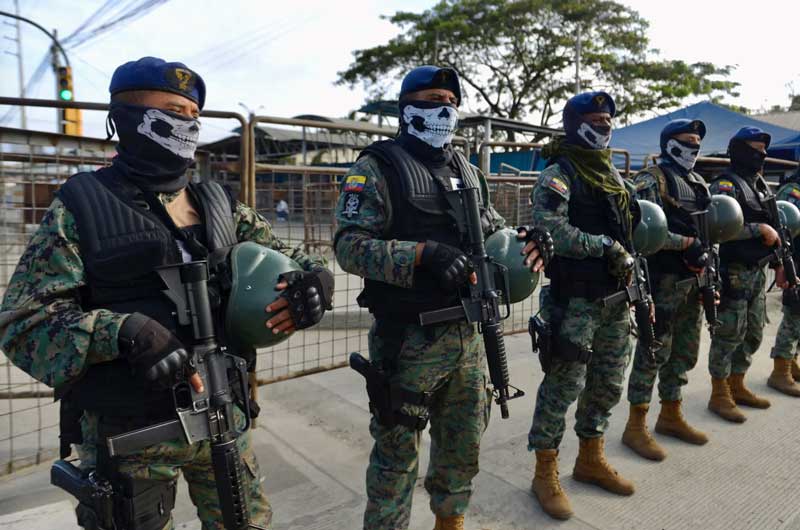President Daniel Noboa’s strategic move to initiate a security consultation comprising 10 questions has sparked widespread debates about its feasibility and potential ramifications.
Below we delve into the intricacies of the processes these questions must undergo and emphasizes the multifaceted nature of the proposed reforms.
At the heart of President Noboa’s proposed security consultation is the pressing need to address the surge in crime rates in Ecuador. The urgency is evident, but the procedural landscape paints a more extended timeline, surpassing 160 days, before any substantial outcomes can be realized. This period encompasses a meticulous 20-day review by the Constitutional Court, followed by an active campaign to promote the consultation’s content.
Unpacking the urgency
President Noboa’s candid declaration that “we are screwed with insecurity” underscores the urgency behind these proposed reforms. Alarming statistics reveal a doubling of violent deaths from 23 to 46 per 100,000 inhabitants within a single year, necessitating the swift implementation of effective measures.
Immediate impact limited
While the stakes are high, President Noboa pragmatically acknowledges that immediate change is unlikely. Among the 10 questions posed, only two have the potential for immediate impact upon the publication of results.
Armed Forces Intervention
Question 1 introduces the proposition of the Armed Forces intervening against transnational criminal organizations. The historical challenges associated with altering the military’s role introduce uncertainties. Success is contingent on reserved decisions from the Public Security Council (COSEPE), adding an additional layer of complexity to the proposal.
Control of Weapons and Supplies
Question 2 advocates for permanent controls on weapons, ammunition, and explosives by the Armed Forces around penitentiary centers. However, the effectiveness of this proposal is contingent on the military’s ability to prevent the entry of illegal supplies into prisons, an issue that has persisted despite existing regulations.
Remaining questions and ambiguities
The annexes to the other eight questions reveal a lack of clear and effective measures, seemingly functioning as expressions of intent to garner citizen support for potential legislative action. Notably, President Noboa possesses the option to bypass the Constitutional Court, potentially expediting the process by directly sending reforms to the Legislature and saving approximately 95 days.
Even if the proposed reforms successfully navigate through the intricate path to the Legislature, there is no guarantee of alignment with the Executive’s vision. The lack of specificity in the questions and annexes leaves ample room for modifications, potential rejection, or demands for more precise proposals by different political forces within the Assembly.
Presidential Confidence and Voter Influence
President Noboa’s unwavering confidence in the people’s support is evident, as he warns assembly members of potential consequences at the polls in 2025 if they fail to process or modify the reforms. The inherently flexible nature of the legislative process allows for alterations based on political convictions and interests, creating an environment of uncertainty regarding the final outcome.
Amidst the complexities of the proposed security consultation, the role of the public becomes paramount. The success of the reforms hinges not only on intricate political processes but also on citizen engagement and support. The President’s reliance on public opinion to exert pressure on assembly members underscores the participatory nature of the proposed reforms.
A final analysis
The multifaceted nature of President Noboa’s security consultation prompts a comprehensive analysis of its potential impact on Ecuador’s security landscape.
The 112-page document is under review by the Court, which has a period of 20 days to rule. This is a series of intentions in search of citizen support, so that the National Assembly processes criminal and judicial reforms that the Executive has not made transparent.
This is even though these reforms could be sent directly by President Noboa to the Legislature, without having to go through the Constitutional Court and the ballot boxes. Which would imply, in maximum terms, about 95 days until the elections, without counting the time it takes to make the results official.
In addition, the annexes to these questions establish an additional period of 65 days for the measures to come into effect if they pass all the filters. Since the President will have five days to send the proposals to the Assembly and it, in turn, will have two months to approve them.
Thus, in total, the complete approval of the reforms could take more than 160 days. That is, about six months.


Unless the So Called law enforcement groups can kill on site, the seeds of criminology will continue for generations. Neither prisons nor reforms will work. Not EVER/ NEVER.